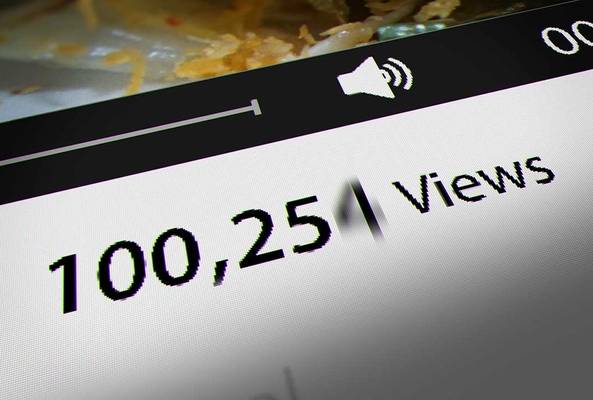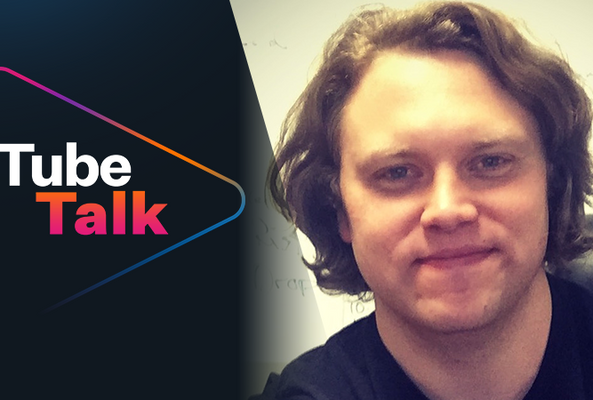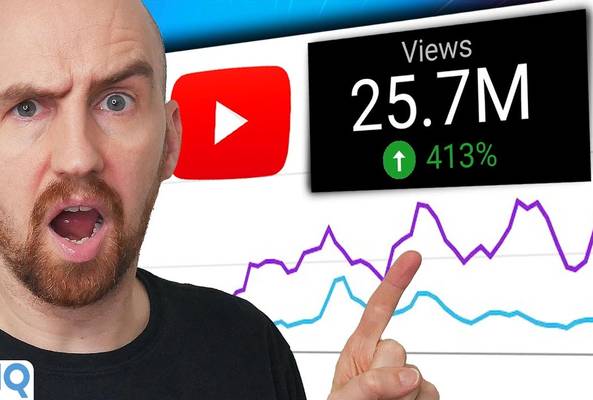Carla Marshall has 10+ years of experience in video marketing, social media management, content marketing, DRM, and SEO. She was previously Editor in Chief at ReelSEO.com, and as a journalist and video marketer, she's covered news stories, creator journeys, and digital-first publishing initiatives across all the major online video platforms. She is YouTube Certified and a judge for the Shorty Awards, as well as the UK, US, Canadian, Global, and EU Search Awards.
How to Create a YouTube Channel: 10 More Amazing Tips
If you're reading this blog post then it's a pretty good bet that you're ready to make the leap and start the YouTube channel you've been promising yourself to. While it's a cliche, there really is never a better time to do so than right now. We're making it easy for you with the tips and tricks all the successful YouTubers use.
Check out our first blog post 'How to Start a YouTube Channel: 10 Brilliant Tips', download our free YouTube tool, and don't forget to subscribe to our YouTube channel so you get all the help you'll need on this exciting journey!
How to Create Your YouTube Channel: 10 Amazing Tips
Check out all 20 tips in the following video:
Tip #1 Write a full ‘About’ section for your YouTube channel
First of all it addresses what the viewer is going to get from your channel. Introduce who you are a little bit, and then reinforce what the viewer is going to get with even more good stuff in another paragraph. YouTube does search these channel descriptions, so it also helps with your SEO.
Tip #2 Invest in lighting equipment
If you're going to be filming outside most of the time, brilliant, you've got all the natural light in the world. However, if you're filming indoors, you probably want to invest in some proper studio lighting, because it will have a massive impact on the quality of your videos. Great lighting can really help with your videos, much more than say a new camera, at least in my opinion.
Tip #3 Go all-in with YouTube Custom Thumbnails
Now for a whistle-stop tour of some thumbnail tips and tricks:
- If humans are going to be in the thumbnail, think of the three E's: eyes, excitement, and emotion. Connect the people with the viewer, and they're more likely to click on the thumbnail.
- Use colorful backgrounds that help separate the foreground and backgrounds that contrast with competitors, so that you really stand out when people are scrolling through the search results, and their browse feeds, because your thumbnail looks so different to everybody else's.
- Oversaturate the colors in your thumbnails, to give them more pop when they are reduced in size. You can also sharpen the thumbnails for exactly the same reasons.
- Use the thumbnail to tease a story of the video itself. You want to entice people to click, but not to give them the whole story so they have no reason to click.
- If you're doing tutorials, show the viewer the payoff in the thumbnail. They'll still need to watch the video to know how to get there.
- Design small. Remember, you will create your thumbnail on a full screen, but all of your viewers will see the thumbnail in a different size.
- And when you finish a thumbnail, take an objective look at it and say to yourself, would I click on this thumbnail? If you're not likely to, neither are your viewers.
You are right in that we barely scratch the surface here, so check out our full YouTube playlist on custom thumbnails here, and also check out the thumbnail courses in the vidIQ Academy.
Tip #4 Become a KILLER editor
Don't just record footage, make sure to edit it as well. It may often be the case that you have half of your footage on the cutting room floor that you never use, and that's fine, because you only want the best and tightest footage to put to an audience. You can also use editing to shave off those little pauses at the beginning, in the middle, the end of your talking.
And, also think about pattern interrupts. Have you noticed something different about this part of the video? It's because I'm not using any pattern interrupts. I'm just talking, and it's probably getting a little bit boring for you now, because I'm not doing any of the sound effects, and music's not playing. The camera's not changing, and shifting angles a little bit, and... You see, I've paused here, and I've got it wrong, and I'm not going to edit this out, I'm going to keep it in, because that's where you'd want to edit your wrong stuff out.
Anyway, where was I? Pattern interrupt. It allows you to keep the viewer engaged by changing something in the scene, every five to 10 seconds. Try that the next time you're editing your videos, and instead of a minute-long worth of rambly stuff, you'll get a clean 15-second footage that your audience will enjoy a lot longer.
Tip #5 Remember to be you!
This is something I have to constantly remind myself because it's so easy to change persona when you press a record button. Remember to be you. There's only one of you in the entire world unless you have an identical twin. Your audience wants to see something different, something that they can't get anywhere else, and they can only get that from you if you are uniquely you.
If you try to imitate somebody else, it won't feel authentic, and your audience will see right through it. When you start to relax and be you on camera, as hard as that can sound to begin with, when you press record, your audience will start to react to you.
Now, it could be that the audience loves you, or the audience hates you. The important thing is, is that they feel something about you. That's what you want from your audience. And you can ignore all of the people who hate you. You don't need to care about them. You need to put all of your love into those who love you back. Embrace your audience.
But, the moment you start to worry about the judgment of your audience, that's when you start to change on camera, and you don't be you anymore. All of the mannerisms, the way you talk, the quirks that you have, embrace them, and share them on YouTube because if you don't, that's going to leave a mark on your ego.
Tip #6 YouTube Keyword Research FTW
All right, time to get into some keyword research basics. Get into the head of what your typical target audience viewer is likely to search for on YouTube, and create content, and titles, and metadata around those search terms.
The YouTube Search bar itself is a super powerful tool because it auto predicts what people are searching for, depending on the time of year. For example, as I record this at the end of December if I type in just the word star, it brings me back all of the results for 'Star Wars Episode 9: Rise of Skywalker', because that is trending right now. Use it on your own topic, to find out what people are searching for, and again make content around those subjects.
Use the VidIQ tools to find out what keywords have potential on YouTube, those being with high search volume, but low competition. And although tags are no longer important, it's still interesting to look at the metadata that other creators are using, because it represents the detail and level of research that goes into their content. I will still argue that it's much better to give YouTube as much information about your video as possible, rather than none at all. It may give you the marginal edge, versus other videos who are competing with you, who are a similar size.
And once again, that is a fraction of a percentage of the knowledge that we have about keyword research. We have even more information in an hour-plus course on the vidIQ Academy, along with this video and this post on keyword research for YouTube:
Tip #7 Become part of the YouTube community
When you start to make videos on a particular topic, you become part of that YouTube community. Make sure to join it. And by that I mean watch other peoples' content, and post comments, add to the discussion.
People will start to recognize your name in the comments, and by adding value, not just trying to spam your own stuff, people will be interested in you and come to watch your content. And who knows, the video creator themselves might recognize you after a while, and you could potentially do a collaboration.
Try not to think of other video creators in your space as competition, but as collaborators. The nature of video creating on YouTube, forces it into a singular, sometimes lonely experience, and there are millions of video creators who do this, but they're all working towards the same goal, to make an impact on a shared audience. Why not share the creating experience as well? You get to share your audience with somebody else's audience, and vice versa.
Just remember this at the forefront of your communication with others. It's all about the value that you can add, not what you can take out of it. That comes afterwards, and it becomes a far greater reward when you achieve this.
Tip #8 Maximize Your YouTube Description
Got some quick YouTube description tips for you now:
- The first two lines of your video description are super important because they can be seen when people are going through the search results on a YouTube page. So try to write your description as if you are writing a traditional tweet of 140 characters.
- Make it super valuable, full of metadata, and further tease the viewer into the video.
- Somewhere within the description, try and write a paragraph that includes as many of the keyword phrases as possible for the video, but make sure that it still reads as a proper English sentence.
- And if you can, try to add timestamps of your video, because they may end up on Google Search, which gives you another avenue of YouTube views.
Tip #9 Set realistic goals and be patient
If you're this deep into the video, you've probably got a lot of this in abundance, but it does bear repeating because YouTube can be a tough game.
To succeed as a video creator, you are going to need determination and patience. You may take all the advice from many sources, all good, put it into practice, and then you may see very little in return for a very long time. You could be 200 videos, and six months into this, and wonder why am I not gaining views and subscribers? And then, all of a sudden, it happens overnight, and you have a viral moment for your channel.
For a lot of creators on YouTube, overnight success takes weeks, months, sometimes even years. Just remember this, if you're putting in the hard work, and the analytics are telling you good things, as well as your audience, eventually, YouTube will stop ignoring you, and start to distribute your content to more people, but it does sometimes take a little longer than what you might think.
With that in mind, I want you to set goals that are achievable in the next month to three months. Rather than setting your first goal to monetize your content, try and go for something more obtainable, like 50 subscribers, 100 subscribers, 10,000 views. Those sort of step by step targets that you can celebrate on an incremental level until you reach those big goals.
If your first goal is to monetize your content on YouTube, again you're thinking about how you can extract as much as possible from YouTube, as opposed to providing as much value to your audience as possible.
Tip #10 Don’t say goodbye too soon
“And that's it”, “thanks for watching,” “hope you enjoyed this video.” All words and phrases you should never use at the end of a video. The moment a viewer can sniff that you're trying to wrap up a video, using trigger words such as that, they will immediately switch off.
You should be keeping the viewer engaged right up to the moment the video ends. Yes, you can have calls to action, to ask people to subscribe to your videos, etc, but never tell the viewer that it's basically time to switch over.
Want To Get More Views on YouTube?
If you want to take your YouTube channel to the next level and get more views on YouTube then make sure to download vidIQ. Join over 1 million other users and use vidIQ to help you research YouTube, analyze videos, audit your own channel, and take actionable steps click here to install now!
And if you’re really serious about growing your YouTube views and subscribers, sign up for exclusive access to the vidIQ Academy and learn how to launch a successful YouTube Channel in just 30 days.



